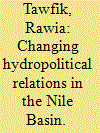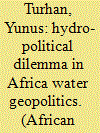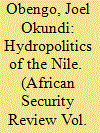| Srl | Item |
| 1 |
ID:
147933


|
|
|
|
|
| Summary/Abstract |
A new hydro-political order is emerging in the Nile Basin. Upstream riparian states have improved their bargaining power vis-à-vis downstream countries by adopting a common position in the negotiations over a new framework agreement to govern the utilisation of the Nile waters. Some upstream riparians have unilaterally constructed hydraulic projects that threaten Egypt’s hegemonic position in the basin, the most notable of which is the Grand Ethiopian Renaissance Dam (GERD). Whether these developments will lead to a more equitable utilisation of water resources and a more cooperative order will depend on the policies of the riparian states, especially in the Eastern Nile. Respect of the Declaration of Principles on the GERD signed between Egypt, Ethiopia and Sudan could help build trust between the three countries after years of tensions around the project. Beyond that, a basin-wide plan for the utilisation of water resources would not only maximise the benefits from the river and address the common challenges facing the basin, but also reduce the political costs of tensions on future projects.
|
|
|
|
|
|
|
|
|
|
|
|
|
|
|
|
| 2 |
ID:
177867


|
|
|
|
|
| Summary/Abstract |
Water-related conflict chronology can be grouped around two broad sets of ideas: On the one hand is material-related conflict such as water stress and under-development; while on the other is management-related conflict including state-failure and lack of governance. In line with the latter form of conflict, this paper gives a specific consideration to the three types of causal factors looming with the potential for conflict over the Nile basin: Political tensions among stakeholders, lack of all-inclusive agreement on management of the Nile water, and states' unilateral actions. By identifying these causal factors, this study limits itself to focus on the initial phase of conflict resolutions, that is diagnosing sources to select some aspects of perceived reality and make them more salient in the methodological context. Based on Johan Galtung's theoretical approaches on conflict dynamics, the paper explores two areas that are lacking in current literature. It accounts for the sources of conflict over the Nile basin hinging on three variables, while mapping the nature of the on-going negotiation process around Ethiopia's “Grand Ethiopian Renaissance Dam” construction. This process is distributive in form and offers a collaborative (win-win) form of negotiations to cement the latter and to redress current predicaments.
|
|
|
|
|
|
|
|
|
|
|
|
|
|
|
|
| 3 |
ID:
144710


|
|
|
|
|
| Summary/Abstract |
This article analyses the political relationship between Ethiopia and Egypt. It aims to provide an analytical framework to unpack this complex relationship and assess the impacts that the Nile River has on the nature of this relationship. It further identifies geopolitical factors determining the impacts of the Nile River on frameworks of actions and political opportunity structures in which political actors operate. Accordingly, the different combinations of these determinants lead to the formation of political actors and ensuing actions that can fuel conflict, sustain the status quo or build peace. The article seeks to provide tentative answers to the following questions: what can be done or what mechanisms might be used to reduce the risk of conflict? What parties should participate and what will be their roles? And how can modern technology and science contribute to a possible solution?
|
|
|
|
|
|
|
|
|
|
|
|
|
|
|
|